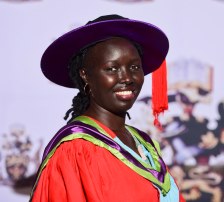
I currently work for the Kenya Agricultural and Livestock Research Organization-Coffee Research Institute as a coffee breeder. I studied at the University of Nairobi for my BSc. Agriculture, MSc. Plant breeding and genetics and currently I have been awarded the Doctor of Philosophy (PhD) in plant breeding and genetics at the same University. I have worked in the coffee breeding department for the last 9 years bringing in vast experience in coffee improvement. The objective of my breeding work is development of coffee varieties that combine both high yield, disease resistance, drought tolerance and good cup quality. The ongoing breeding programs are geared towards development of coffee varieties are at different development stages. One of the programs includes search for markers associated with Coffee Berry Disease resistance using SNPs with GWAS and QTL mapping. The molecular work would enhance our breeding activities and shorten the breeding time for coffee varieties. Other related work includes germplasm conservation and the production of coffee planting materials in form of seed and seedlings for distribution to farmers. Currently, I am evaluating coffee genotypes that have been received from different parts of the world for adaptability trials under the International Multi-Location Variety Trial (IMVLT) in collaboration with World Coffee Research (WCR) as the Principal Investigator. The trials sites are located in Ruiru and Koru sites in Kenya.
Abstract
The Kenya annual coffee production has in recent years declined due to different factors such as change of land use and biotic stresses, despite the country being one of the world’s producers of high-quality coffee. This study analysed the agronomic potential of Arabusta hybrids developed from C. arabica and C. canephora for their bean yield, quality, and disease resistance. Nineteen Arabusta genotypes were assessed in two different locations (Siaya ATC and KALRO-Alupe) for growth and bean yield during the second and third years after establishment in the year 2017 and 2018 respectively. Arabusta hybrids that had higher yields when compared to other genotypes in Busia were ARH1, ARH4, and ARH5 whereas in Siaya it was ARH4.The polymorphism between the Arabusta genotypes and the Arabica coffee varied, with 72% polymorphism calculated among Arabusta genotypes and 46.8% among the Arabica genotypes. The SSR marker SAT 235 was able to identify genotypes that have the CK-1 gene for coffee berry disease resistance. Significant variation in sensory and bean grade traits showed that Arabusta hybrids gave higher scores than backcrosses and Robusta. Acidity showed significant positive correlation with aroma (r=0.84), balance (r=0.85), flavour (r=0.96) and preference (r=0.96). The 100 berry weight showed a positive correlation with the AA bean size indicating that berry weight can be used to predict AA bean size. Arabusta hybrids, backcrosses, and Arabica coffee on average had higher levels of sucrose, oil, and trigonelline when compared to Robusta which was responsible for the improved liquor quality.
Research Supervisors
Prof. Kahiu E Ngugi
Prof. James W Muthomi
Dr. Chrispine O. Omondi
